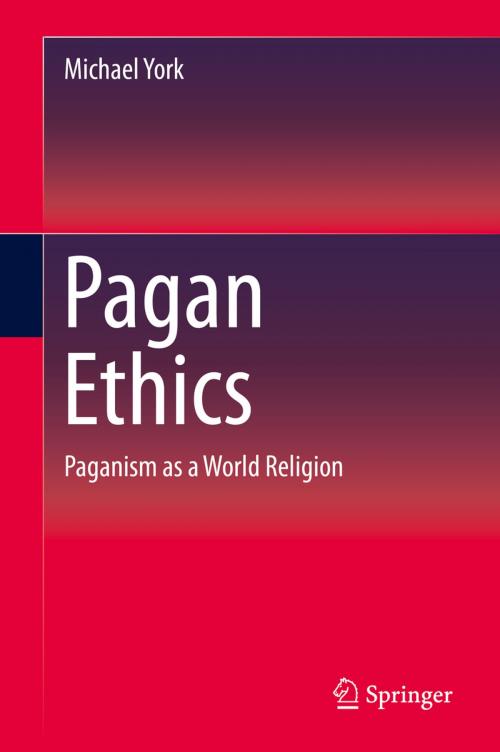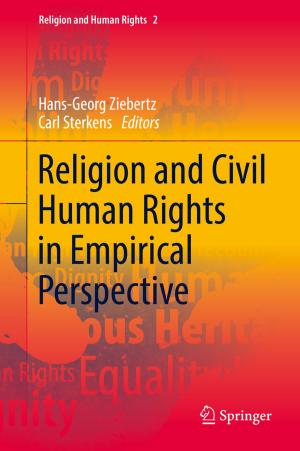Pagan Ethics
Paganism as a World Religion
Nonfiction, Social & Cultural Studies, Social Science, Sociology, Marriage & Family, Religion & Spirituality, Philosophy, Ethics & Moral Philosophy| Author: | Michael York | ISBN: | 9783319189239 |
| Publisher: | Springer International Publishing | Publication: | August 5, 2015 |
| Imprint: | Springer | Language: | English |
| Author: | Michael York |
| ISBN: | 9783319189239 |
| Publisher: | Springer International Publishing |
| Publication: | August 5, 2015 |
| Imprint: | Springer |
| Language: | English |
This book is the first comprehensive examination of the ethical parameters of paganism when considered as a world religion alongside Christianity, Islam, Judaism, Hinduism and Buddhism. The issues of evil, value and idolatry from a pagan perspective are analyzed as part of the Western ethical tradition from the Sophists and Platonic schools through the philosophers Spinoza, Hume, Kant and Nietzsche to such contemporary thinkers as Grayling, Mackie, MacIntyre, Habermas, Levinas, Santayana, etc. From a more practical viewpoint, a delineation of applied pagan ethics is then presented in connection with current moral issues such as same-sex union, recreational drugs, environmental awareness, abortion and terrorism. Finally, overviews of sectarian pagan ethics (Shinto, Santeria, Heathenism, Druidry, Romuva, Slavic, Kemeticism, Classical and Wicca) provide both the general and pagan reader with an understanding of the provocative range and differentiation of pagan ethical thought. The book approaches the Western ethical tradition as an historical development and a continuing dialogue. The novelty of this approach lies in its consideration of paganism as a legitimate voice of religious spirituality rather than a satanic aberration or ridiculous childish behavior. The book is aimed at both the contemporary Western pagan and anyone with an interest in the moral dilemmas of our times and the desire to engage in the global ethical discussion. Among the more important features of the book are its presentation of a re-evaluation of idolatry, the notion of the virtue value, the richness of the pagan tradition, and the expansion of Western ethics beyond its Christian heritage.
This book is the first comprehensive examination of the ethical parameters of paganism when considered as a world religion alongside Christianity, Islam, Judaism, Hinduism and Buddhism. The issues of evil, value and idolatry from a pagan perspective are analyzed as part of the Western ethical tradition from the Sophists and Platonic schools through the philosophers Spinoza, Hume, Kant and Nietzsche to such contemporary thinkers as Grayling, Mackie, MacIntyre, Habermas, Levinas, Santayana, etc. From a more practical viewpoint, a delineation of applied pagan ethics is then presented in connection with current moral issues such as same-sex union, recreational drugs, environmental awareness, abortion and terrorism. Finally, overviews of sectarian pagan ethics (Shinto, Santeria, Heathenism, Druidry, Romuva, Slavic, Kemeticism, Classical and Wicca) provide both the general and pagan reader with an understanding of the provocative range and differentiation of pagan ethical thought. The book approaches the Western ethical tradition as an historical development and a continuing dialogue. The novelty of this approach lies in its consideration of paganism as a legitimate voice of religious spirituality rather than a satanic aberration or ridiculous childish behavior. The book is aimed at both the contemporary Western pagan and anyone with an interest in the moral dilemmas of our times and the desire to engage in the global ethical discussion. Among the more important features of the book are its presentation of a re-evaluation of idolatry, the notion of the virtue value, the richness of the pagan tradition, and the expansion of Western ethics beyond its Christian heritage.















